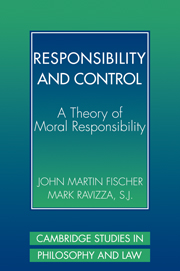Book contents
- Frontmatter
- Contents
- Acknowledgments
- 1 Moral Responsibility: The Concept and the Challenges
- 2 Moral Responsibility for Actions: Weak Reasons-Responsiveness
- 3 Moral Responsibility for Actions: Moderate Reasons-Responsiveness
- 4 Responsibility for Consequences
- 5 Responsibility for Omissions
- 6 The Direct Argument for Incompatibilism
- 7 Responsibility and History
- 8 Taking Responsibility
- 9 Conclusion
- Bibliography
- Index
5 - Responsibility for Omissions
Published online by Cambridge University Press: 05 June 2012
- Frontmatter
- Contents
- Acknowledgments
- 1 Moral Responsibility: The Concept and the Challenges
- 2 Moral Responsibility for Actions: Weak Reasons-Responsiveness
- 3 Moral Responsibility for Actions: Moderate Reasons-Responsiveness
- 4 Responsibility for Consequences
- 5 Responsibility for Omissions
- 6 The Direct Argument for Incompatibilism
- 7 Responsibility and History
- 8 Taking Responsibility
- 9 Conclusion
- Bibliography
- Index
Summary
INTRODUCTION
In previous chapters we have argued that persons can be morally responsible for actions and consequences that are inevitable for them. That is, there are cases in which an agent can legitimately be held morally responsible for performing an action he could not have avoided performing; and there are cases in which an agent can legitimately be held morally responsible for a consequence-universal that he could not have prevented from obtaining. Further, we have argued that a certain sort of association of moral responsibility with control helps to explain these facts. More specifically, the association of moral responsibility with guidance control helps to explain why moral responsibility for actions and consequences does not require alternative possibilities.
We now turn to omissions. We shall begin, as in our discussion of moral responsibility for consequences (in Chapter 4), with a puzzle. We shall then look to the nature of control – in particular, guidance control – to help to resolve the puzzle.
SOME EXAMPLES
Omissions and Alternative Possibilities. Performing actions and bringing about consequences are instances of what might be called “positive agency”. It will be useful to recall here an example involving positive agency, “Hero.”
In “Hero,” Matthew is walking along a beach, looking at the water. He sees a child struggling in the water, and he quickly deliberates about the matter, jumps into the water, and rescues the child.
- Type
- Chapter
- Information
- Responsibility and ControlA Theory of Moral Responsibility, pp. 123 - 150Publisher: Cambridge University PressPrint publication year: 1998
- 1
- Cited by

